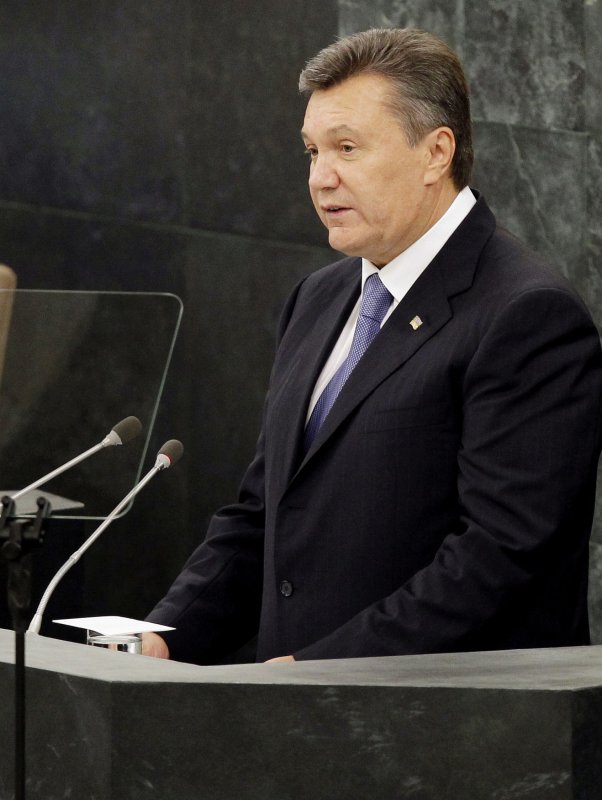President of Ukraine Viktor Yanukovych addresses the United Nations General Debate at the 68th United Nations General Assembly in the UN building in New York City on September 24, 2013. UPI/John Angelillo |
License Photo
WASHINGTON, January 16 -- As politicians and diplomats gathered in a Senate office building Wednesday to discuss possible action against the increasingly repressive government of Ukraine, demonstrators from the Eastern European country gathered in front of the Supreme Court to urge the U.S. to impose economic sanctions.
The group of about 40, draped in blue and gold Ukrainian flags, posed for photographs as they waved signs that read, “Help stop this violence” atop pictures of bludgeon-wielding Ukrainian police and injured protesters. The Supreme Court was the latest site in a series of protests; the demonstrators have also taken their pleas to the Capitol and the White House.
“We are hopeful that some changes will come,” said Dmytro Bondar, a government contractor who moved to Maryland from Ukraine 10 years ago. “We demand sanctions against the president of Ukraine. That’s the only thing that can scare him and stop him from what he’s doing.”
Protests broke out in November in the capital city of Kiev when President Viktor Yanukovych rejected an association agreement with the European Union, despite large public support for the deal. The agreement would have expanded trade relations between Ukraine and the E.U. and paved a course for full membership into the Union, a much-desired pivot towards the West and away from neighbor Russia, which all too often plays an inordinate role in Ukrainian affairs.
Over the next month, as hundreds of thousands of Ukrainians turned out across the nation to protest the president’s decision, they were met with violence. The government turned a blind eye as riot squads beat protesters and harassed independent journalists. Last weekend, a prominent opposition party leader was hospitalized after he was beaten over the head by police during a demonstration.
“I just came from Ukraine a couple weeks ago,” Bondar said. “The conditions people are living in are unbelievable.”
“This is an issue of human rights violations and democracy,” said Olya Yarychkivska, a graduate student at Columbia University in New York. “America generally really cares about these values, about the freedom to say what you think.”
Meanwhile, the Senate Committee on Foreign Relations held a hearing to discuss possible financial and political sanctions against Yanukovych if the crackdowns continue.
Sen. John McCain, R-Ariz., who visited Ukraine in December to meet with opposition leaders and express solidarity with the protesters, said the people of Ukraine “want to be European” and the United States must help them move in this direction.
“It’s not just up to the Ukrainian people,” McCain said. “They cry out for our assistance and our moral support in a struggle which is totally unfair, which is characterized by brutal crackdowns.”
Earlier this month, the Senate passed a resolution formalizing the potential for sanctions, including visa bans and asset freezes, if violence against peaceful protesters continues.
“These are challenging times for the people of Ukraine and for people everywhere who care about democracy, economic prosperity, rule of law and a European future for that country,” said Victoria Nuland, assistant secretary for European and Eurasian Affairs at the State Department, testifying before the committee.
“We have been very clear with the [Ukrainian] government that any further serious efforts to repress their own people will be met with a firm response by the United States.”















